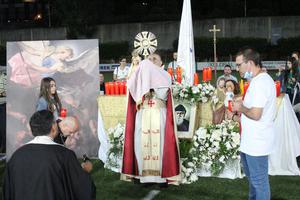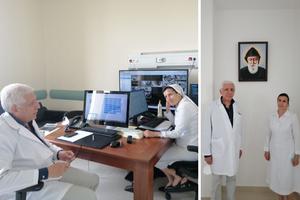Lebanon Picks New President, Ending Void of the Christian-Held Post
The nation’s parliament elected former army general Michel Aoun as leader on Oct. 31.

BEIRUT — Lebanon once again has the only Christian head of state in the entire Middle East and North Africa.
The Lebanese parliament elected 81-year-old former army general Michel Aoun as president Oct. 31, ending a power vacuum that lasted two and a half years.
Under Lebanon’s power-sharing system, the presidency is reserved for a Maronite Catholic, while the prime minister is a Sunni Muslim, and the speaker of parliament is a Shiite Muslim.
Aoun’s election follows 45 successive failed attempts by legislators to elect a president since the mandate of former President Michel Sleiman ended in May 2014, amid a political environment characterized by long-standing divisions exacerbated by the war in neighboring Syria.
The presidential stalemate had crippled Lebanon’s government institutions, and the country was slipping from bad to much worse economically and socially, with the huge influx of Syrian refugees — more than 1.5 million — topping the challenges.
Cardinal Bechara Rai, patriarch of the Maronite Catholics, and other Church leaders had repeatedly pleaded with the politicians to put aside their personal interests and to elect a president for the good of the country.
Aoun is founder of the Free Patriotic Movement, the largest Christian bloc in the Lebanese Parliament. Since 2006, it has been allied with the Muslim Shiite party of Hezbollah, which has ties to Iran.
The political impasse experienced a breakthrough ahead of the Oct. 31 voting, when Saudi Arabia’s closest ally in Lebanon, Sunni Muslim leader Saad Hariri, in an about-face, embraced Aoun’s nomination and gave him his support. Hariri, who heads the main Sunni political group, the Future Movement, was appointed prime minister, as had been expected. That occurred on Nov. 3.
Aoun had also secured the support of longtime Christian rival Lebanese Forces chief Samir Geagea, who also sought the presidential post.
Of the 127 parliamentarians, 83 voted for Aoun.
President Aoun in his oath of office pledged to endorse an “independent foreign policy” and to protect Lebanon from “the fires burning across the region.” He also promised a “pre-emptive and deterrent” strategy against terrorism.
In view of the legislative elections before June 20, 2017, the date at which the mandate of the actual parliament finishes, the new president said, “The first prerequisite of real equal [Christian-Muslim] power-sharing is the approval of an electoral law that ensures fair representation before the date of the next elections.” Approximately 40% of Lebanon’s existing population of about 4 million is Christian.
“We must also address the Syrian refugee crisis through securing a quick return” for the displaced to their country, Aoun added, stressing that “refugee encampments and gatherings must not turn into security ghettos.”
Aoun is the 13th president since Lebanon gained independence from France in 1943.
Bishops’ Statement
The Maronite Council of Bishops, in a statement Nov. 2 following their meeting presided by Cardinal Rai at Bkerke, the patriarchal seat north of Beirut, congratulated Aoun and noted the efforts exerted by all parties to end the presidential vacuum.
“The new president included in his mandate’s program the sought stability on the political, security, social, economic and administrative levels,” the bishops pointed out.
They called for a “swift formation of a new capable and effective government,” as well as a new election law that would guarantee fair representations for all sides.
The day before, President Aoun received a delegation of Maronite bishops at the presidential palace, dispatched by their patriarch to offer congratulations to Aoun on his election.
Speaking for the delegation following their meeting with the president, Maronite Bishop of Beirut Boulos Matar said, “This nation is in need of a new start, in addition to a balanced work and consensus amongst all the Lebanese.”
The Lebanese people have been waiting for that new start for 29 months.
“Now with a new president, the reformulation of state institutions can commence in earnest: a new cabinet followed by a new electoral law leading to new parliamentary elections,” Habib Malik, associate professor of history at the Lebanese American University in Byblos, told the Register.
“But matters will likely not proceed as smoothly as the weary Lebanese are expecting,” Malik said, explaining that “much horse trading among the major players — the leaders of the various political and sectarian factions in the country — culminating in the proverbial backroom deals will need to happen first before the Lebanese can begin to feel any positive impact of all this in their daily lives.”
“Sadly, nepotism and corruption remain the twin features of Lebanese political life that will not change,” he added.
Still, Malik concluded, “Despite Lebanon’s myriad problems — some of them grave — Lebanon remains the freest society in the Arab world.”
Register correspondent Doreen Abi Raad writes from Beirut, Lebanon.
- Keywords:
- doreen abi raad
- lebanon
- middle eastern christians
















